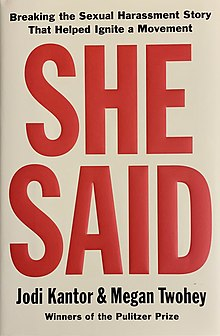
In She Said, journalists Jodi Kantor and Megan Twohey of The New York Times detail how they came to write, research and publish an investigative piece on film producer Harvey Weinstein’s history of sexually harassing and abusing women who worked for/with his companies over a span of decades. What they did not foresee and which they also document is how their report ultimately led to the revival of the Me Too movement, with countless women of a multitude of professions globally opening up about their own experiences in the aftermath of the piece’s publication.
- A compelling, blow-by-blow account of the investigative work for what became one of the most significant news reports of the century, which provides gut-wrenching and often harrowing descriptions of the abuse of power at the heart of sexual harassment and the devastating impact it can have upon victims, particularly when people working for the perpetrator found ways to keep the truth from getting out.
- As they recount their work (even including email, text and conversation transcripts from the time), Jodi Kantor and Megan Twohey’s writing oozes compassion as they discuss why Harvey Weinstein’s victims had not come forward before, and sometimes consider this in relation to similar cases that testified to the psychological toll that such perpetrators’ actions can have. Yet also they testify, through the findings of this and other reports that they worked on, that so often a victim of sexual harassment can find solidarity with others subjected to it by the same perpetrator, and that by coming together they can expose a behavioural pattern and it will not be a case of “her word against his”.
- Throughout the recounting of their investigative work and subsequent write-up, Jodi Kantor and Megan Twohey refer to journalistic principles and the requirements regarding the standard of their reporting, thereby demonstrating how complex a job it can be, how they went about writing something watertight for which (if sued) no judge could rightly rule against them, and testifying to the nitty-gritty work of investigative journalism and its subsequent rewards.
- An objective approach is implemented in the consideration of the subsequent revival of Me Too, as the authors make it clear that, regardless of one’s feelings towards the movement, it is impossible to deny that it highlighted how ill-equipped so many companies were to handling allegations of sexual harassment, as well as the difficulties people find in talking about that issue.
- Although featuring a good account of the case made against Brett Kavanaugh in 2018, given that case’s significance, more pages could have been dedicated to it to flesh out more of its nuances.
VERDICT: MUST